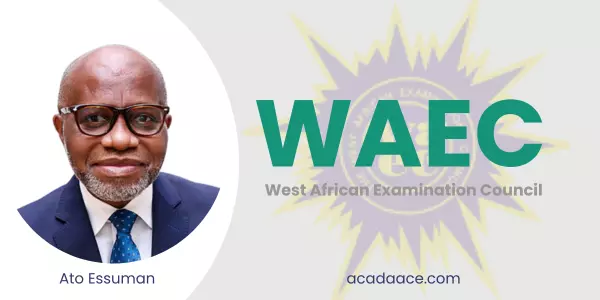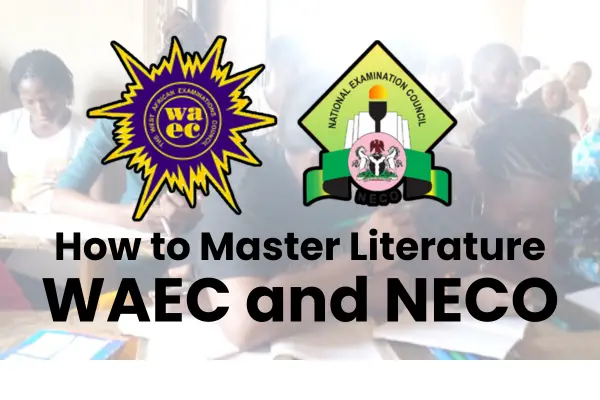WAEC – West African Examinations Council: All You Need to Know

The West African Examinations Council (WAEC) is an examination board that conducts the West African Senior School Certificate Examination (WASSCE) for secondary school students in West Africa. Founded in 1952, WAEC is an independent, non-profit organization with the mandate to determine the examinations required in the public interest in the English-speaking West African countries, to conduct the examinations and to award certificates comparable to those of equivalent examining authorities internationally.
- Historical Background of WAEC
- Meaning of WAEC and Its Role in Administering Examinations in West Africa.
- Organizational Structure – How WAEC is Composed, Key Departments and Roles.
- Exam Procedures – How Students Register, Sit for Exams, Receive Results
- Examinations Administered by WAEC
- Subjects Offered by WAEC for School Candidates
- Countries that Write WAEC
- When Does WAEC Conduct Examination?
Historical Background of WAEC
The West African Examinations Council has its roots in the Colonial era. In the 1940s, during the period of British rule, the West African Inter-Territorial Joint Matriculation Board was established to oversee common examinations across Nigeria, Gold Coast (now Ghana), Sierra Leone and Gambia. This board was later renamed the West African Examinations Council in 1952, with a mandate to harmonize and conduct examinations in West Africa. After independence, the council was indigenized and ownership passed on to the governments of member countries. Liberia became the fifth member of WAEC in 1974. Over the decades, the scope of WAEC has expanded beyond school-leaving examinations to include a wide range of international and regional exams. Despite some challenges, WAEC has played an important role in educational development in Anglophone West Africa for over 70 years.
Meaning of WAEC and Its Role in Administering Examinations in West Africa.
Here is a brief overview of WAEC and its role in administering examinations in West Africa:
- WAEC stands for West African Examinations Council. It is an examination board that conducts examinations and awards certificates comparable to secondary school leaving certificates in West African countries.
- WAEC was established in 1952 with the aim of conducting standardized examinations in English-speaking West African countries. The headquarters is located in Accra, Ghana.
- The core mandate of WAEC is to conduct the West African Senior School Certificate Examination (WASSCE) for secondary school leavers and award them certificates. The WASSCE is a standardized regional examination taken by students at the end of their secondary education.
- Other examinations conducted by WAEC include the Basic Education Certificate Examination (BECE) for junior high school leavers, and other international examinations like TOEFL, SAT and IELTS.
- The board’s examinations are recognized globally and serve as a university entry qualification in West African countries including Nigeria, Ghana, Sierra Leone, Liberia and The Gambia among others.
- The certificates awarded by WAEC attest to the candidate’s educational standard and allow graduates to gain admission into universities and pursue higher education.
Organizational Structure – How WAEC is Composed, Key Departments and Roles.
- Governance: WAEC is governed by a board called the Council. The Council comprises representatives from all member governments.
- Leadership: The chief executive is the Registrar, who oversees the day-to-day administration of WAEC.
- Departments: Key departments include Examinations, Finance, Research, Human Resources, Information Technology, General Services, etc.
- Examinations Department: This is the core department responsible for developing, administering and marking examinations. Key roles include test development, examinations administration, marking, grading, certificate production and issuance.
- Finance Department: Manages the finances, budgets and accounts. Ensures prudent fund management.
- Research Department: Conducts research to improve examinations and assessment. Recommends techniques to curb examination malpractice.
- Human Resources: Recruits staff, manages payroll and personnel matters.
- Information Technology Department: Manages IT infrastructure and solutions for the organization.
- International Examinations Department: Manages international examinations like TOEFL, SAT and IELTS.
- General Services: Provides services like procurement, asset management, transport, security etc.
- National Offices: WAEC has offices in each member country responsible for coordinating examinations and preventing malpractices locally.
Exam Procedures – How Students Register, Sit for Exams, Receive Results
Registration:
- Students register for WAEC exams through their schools. Schools collate registrations and submit them along with payment to the body.
- Private candidates register directly with WAEC offices. Registration periods are usually some months before exams.
- Students receive photo ID cards as proof of registration. Exam timetables are also provided.
Sitting for Exams:
- WAEC exams are held annually, usually in May/June for WASSCE.
- Exams take place over a period of 1-2 months at designated exam centers.
- Students must be in proper school uniforms and sit at assigned desks. Invigilators monitor exams.
- Exams typically last between 2-3 hours per subject. Various rules/regulations must be followed.
Receiving Results:
- After marking, the boaerd releases provisional results to schools and candidates online.
- Students can check results by SMS or going to WAEC website and entering ID details.
- The Council may withhold results of candidates suspected of exam malpractice.
- After ratification, WAEC releases final results. Certificates are printed and distributed through schools.
- Students can request for re-marking or re-totalling of scripts if they dispute results.
WAEC aims to make procedures transparent, efficient and aligned with best practices globally to maintain integrity and standards.
Examinations Administered by WAEC
Here are some of the main examinations administered by the West African Examinations Council (WAEC):
- WASSCE (West African Senior School Certificate Examination) – This is the main examination taken by senior secondary school students to qualify for university admissions. Subjects tested include English, mathematics, sciences, social sciences, vocational subjects, and more.
- SSCE (Senior School Certificate Examination) – This is a similar examination to the WASSCE but may differ slightly in certain countries.
- JSSCE (Junior Secondary School Certificate Examination) – Examination taken by junior secondary school students in Nigeria.
- BECE (Basic Education Certificate Examination) – Examination taken by students at the end of junior high school in Ghana.
- GCE (General Certificate of Education) – The council administered GCE tests are available for private candidates in West African countries. Two main types are Ordinary Level (O-level) and Advanced Level (A-level).
- TECHNICAL EXAMS – Examinations for technical and vocational subjects like shorthand, typewriting, electronics, and more.
- SPECIAL EXAMS – Examinations designed for candidates with special needs.
- NOVDEC – Special examination series held in November/December for private candidates to retake subjects.
- International examinations – The council has partnerships with examining bodies like UCLES and Edexcel to offer their exams in the region.
The Council continually reviews and updates its examinations to maintain standards and ensure they meet international best practices. Performance on WAEC examinations is a key determinant of students’ future academic and career paths across West Africa.
Subjects Offered by WAEC for School Candidates
Here is a list of the main subjects that WAEC offers for school candidates sitting for examinations like WASSCE and SSCE:
Core/Compulsory Subjects
- English Language
- Mathematics
- Civic Education
Electives/Optional Subjects
- Further Mathematics
- Economics
- Biology
- Literature-in-English
- Chemistry
- Computer Studies/ICT
- Geography
- Physics
- Technical Drawing
- Fine Art
- Islamic Studies
- Christian Religious Studies
- Agricultural Science
- History
- Principles of Accounts
- Commerce
- French
- Hausa
- Igbo
- Yoruba
- Home Economics
- Clothing and Textiles
- Foods and Nutrition
- Management
- Statistics
Vocational Subjects
- Auto Mechanics
- Auto Body Repair and Spray Painting
- Auto Electrical Work
- Auto Parts Merchandising
- Air Conditioning and Refrigeration
- Welding and Fabrication Engineering Craft Practice
- Electrical Installation and Maintenance Work
- Blocklaying, Bricklaying and Concrete Work
- Painting and Decorating
- Plumbing and Pipe Fitting
- Machine Woodworking
- Carpentry and Joinery
- Furniture Making
- Upholstery
- Catering Craft Practice
- Garment Making
- Dyeing and Bleaching
- Printing Craft Practice
- Photography
- Data Processing
- Storekeeping
- Shorthand
- Typewriting
- Office Practice
- Fisheries
- Animal Husbandry
- Forestry
This covers the major subjects WAEC offers. Candidates pick a combination depending on their interests and education system requirements. The number and combination of subjects varies by country.
Countries that Write WAEC
The board currently oversees a unified examination system for five member countries – Ghana, Nigeria, Sierra Leone, Gambia and Liberia. Nearly 3 million candidates register for the WASSCE examinations every year at approximately 7,000 accredited centers. The tests assess students in a wide range of subjects and are a culmination of secondary education in the region. Passing these exams is instrumental for gaining admission into institutions of higher education.
Here is a list of the WAEC member countries and the years they joined:
- Nigeria – 1952 (Founding member)
- Ghana – 1952 (Founding member)
- Sierra Leone – 1952 (Founding member)
- Gambia – 1952 (Founding member)
- Liberia – 1974
The West African Examinations Council was founded in 1952 by Nigeria, Ghana, Sierra Leone and Gambia as the West African Inter-Territorial Joint Matriculation Board. Liberia joined WAEC as a member country in 1974. Currently, WAEC administers examinations in these 5 English-speaking West African countries.
When Does WAEC Conduct Examination?
The WASSCE examinations are conducted in the months of May, June, July and August. Results are typically released 45 days after the exams have concluded. Candidates receive a WAEC certificate upon successful completion that is globally recognized by universities and colleges. Aside from facilitating examinations, WAEC also organizes seminars, workshops and conferences aimed at improving education standards in West Africa. Its vision is to be a world-class examining body that adds value to the educational goals of its stakeholders.





